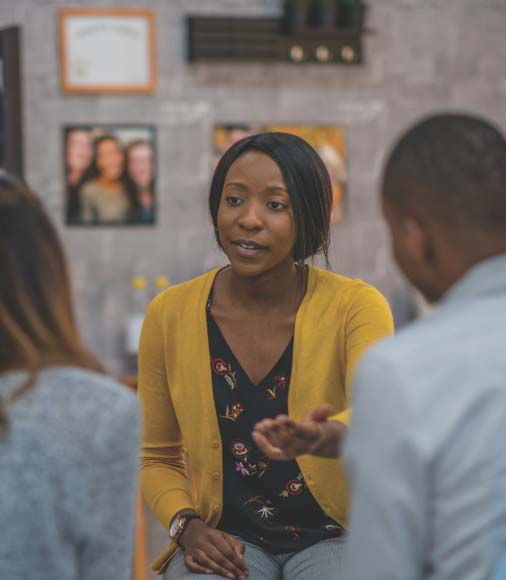Loss & Healing
Supporting Those Who’ve Lost a Loved One to Suicide
Many suicide loss survivors had a particularly challenging time processing their loss during the COVID-19 pandemic, with many traditions commonly helpful toward grieving not as readily available.
This past year, AFSP’s Loss & Healing team has ensured that the important programs and resources that survivors of suicide loss so desperately need continue to be delivered through our local chapters across the country. Through these efforts, we provide love and understanding to help new loss survivors heal from the experience, and perhaps one day even provide the same kind of support to others.
21 different countries 4K views for Day of Hope/
Día de Esperanza event
International Survivors of Suicide Loss Day
Also known as “Survivor Day,” International Survivors of Suicide Loss Day began in 1999, when Senator Harry Reid, who lost his father to suicide, introduced a resolution to the United States Senate that led to the creation of a day each year in which those affected by suicide could join together for healing and support. As the holidays are often a difficult time for suicide loss survivors, it was decided that “Survivor Day” would always fall on the Saturday before American Thanksgiving.
AFSP supports hundreds of large and small Survivor Day events around the world each year. At these informative and caring events – the majority of which were made virtual this past year – survivors of suicide loss came together to find connection, understanding, and hope through their shared experience. While each event was unique, all featured an AFSP-produced documentary that offered a message of growth, resilience, and connection. Just as they always have, this year’s events brought people together to support each other, as they find a way to heal together.
In addition to our local Survivor Day events, AFSP hosted its annual International Survivors of Suicide Loss Day Facebook Live event, which included an AFSP-produced documentary, followed by a discussion moderated by AFSP’s Director of Loss and Healing Programs, Brandon English, joined by suicide loss survivors and AFSP volunteers Wykisha McKinney, Jason Tomkins and Tracy Rassley. This event, through our national social media channel, was preceded one day before by our very first “Day of Hope / Día de Esperanza,” specifically focused on serving suicide loss survivors in the Latinx community.
Facebook @AFSPNational

Healing Conversations
When a person loses someone to suicide, it’s important that they speak to someone who knows what it’s like to go through such a heartbreaking, often confusing experience.
AFSP’s Healing Conversations program gives those who have lost someone to suicide the opportunity to talk with our trained volunteers, who have experienced suicide loss themselves, and know firsthand the pain associated with this type of loss. The volunteers listen openly and without judgment, while also providing resources, comfort and encouragement for the path ahead. What transpires is a warm, supportive conversation designed to help the person cope during what may be the early stages of grief after a suicide.
The program, which is available in person, on the phone or by video chat, received nearly 1,000 requests this year, a 10% increase over the previous year, showing a strong need for this personal connection.
Suicide Bereavement Clinician Training
This past year, over 620 mental health professionals participated in AFSP’s Suicide Bereavement Clinician Training Program (SBCT), which is designed to increase their clinical knowledge of the specific needs of working with those bereaved by suicide. Thanks to the possibility of live remote training, AFSP chapters were able to reach a greater number of participants than ever before, helping to ensure that more mental health professionals know how best to support survivors of suicide loss.
Reaching More Suicide Loss Survivors, and the People Who Care for Them
There is no set timetable for how a person may experience grief-related emotions. We do know, however, that the intensity of those emotions (i.e. how strongly they are felt) does tend to change over time. This year, AFSP hosted two “Healing Milestones” webinars focused on recognizing and understanding the concept of “complicated grief,” in which an individual may seem “stuck” at the same level of intensity of emotions related to their loss over a long period of time: at least six months or more. The webinars, featuring Dr. Katherine Shear of The Center for Complicated Grief at Columbia University, and Wendy Resnick, R.N., M.S., C.S., an AFSP Support Group Facilitator trainer and psychiatric nurse, provided strategies to help those contending with complicated grief to more fully process their loss, and embark on a path toward healing.
AFSP reached over 300 suicide loss survivors through the “Workshop for Suicide Loss Survivors” presented by Dr. Jack Jordan, an expert on suicide bereavement research and clinical practice. The workshop, which included time for Q&A from participants, explored how grief after a suicide can be different than for other types of loss, the family impact of a suicide loss, the types of support available for suicide loss survivors, and different paths toward healing.
As many support groups for suicide loss survivors moved virtual, we comprehensively updated our free listing of support groups to reflect the many virtual options offered both locally and nationally for suicide loss survivors. We also created notable web content to help guide support group facilitators in a virtual environment, through an online webinar presented by Dr. Pamela Gabbay, a trainer in our Suicide Bereavement Support Group Facilitator Training program, which focused on the nuances of running and managing a suicide loss support group virtually.